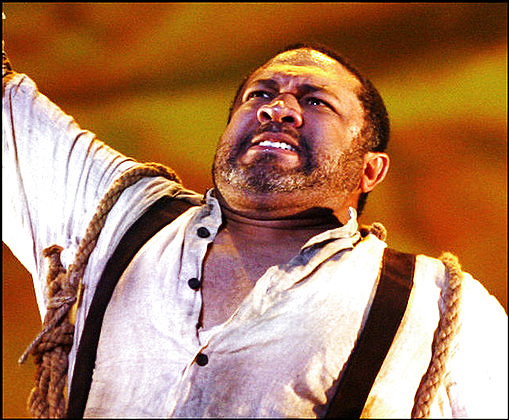 Here is the Washington Post review of the new production of Das Rheingold at the Washington National Opera.
Here is the Washington Post review of the new production of Das Rheingold at the Washington National Opera."A Rheingold that Stands on its Principals"
by Tim Page
The best way to approach Washington National Opera's new production of Richard Wagner's Das Rheingold, which opened Saturday night at the Kennedy Center, is as a solid, abstract and sometimes very attractive updating of a classic.
In short, forget most of what you might have read about this being the first installment of an "American 'Ring' " -- that is, a staging of Wagner's four-evening "Ring" cycle based on what WNO calls the "rich history of the United States." It isn't, unless you count as pointed political commentary, dressing up the earth goddess Erda like the lady on the Land O' Lakes box, casting African Americans in the roles of the captive Nibelungs, and having the giants Fafner and Fasolt bop and swagger like wild 'n' crazy guy construction workers.
Perhaps the next three operas in the series -- a new Die Walkure will enter the repertoire next season, with Siegfried and Gotterdammerung promised for later -- will deepen the American subtext. For now, just enjoy Francesca Zambello's "Roaring Twenties" staging for its general usefulness, its evocative projections (mist, sun, water and some creepy snakes), its occasional moments of majesty and whimsy.
I am grateful, I suppose, that none of the characters wear antlers on their heads, but I am less happy that the production, for the most part, lacks the luminous beauty of the best traditional stagings (Otto Schenk's hypnotic rendition at the Met foremost among them) and the sort of genuine directorial vision that would make for a radical new understanding of the piece.
Still, it will suffice, especially when the performances are as good as they were Saturday. Baritone Gordon Hawkins is simply the best Alberich I've encountered. Grasping, haunted, malevolent -- a monster, of course, but strangely sympathetic at times -- Hawkins's Alberich stole the show as surely as any great Mephistopheles will steal a "Faust." His acting was dynamic and multi-dimensional; moreover, despite the inherent grotesquerie of his character, Hawkins never devolved into Disney horror show. He always made sure the notes were sung -- properly and in tune.
Robert Hale's voice is perhaps a size too small for Wotan -- he brought power to the role but not quite the seemingly effortless power one might have hoped for. That said, he sang with intelligence and sensitivity and brought as much gravity to the character as he could in a production that does not exactly extol Wotan's godliness.
Elizabeth Bishop (Fricka) and Jane Ohmes (Freia) were excellent, singing clearly and soulfully, with proper Wagnerian amplitude. Robin Leggate was a dapper, understated and remarkably lyrical Loge.
The three Rhinemaidens -- JiYoung Lee, Frederique Vezina and Jennifer Hines -- were lovely all around, singing with welling, primordial freshness. Elena Zaremba sounded curiously husky and strained as Erda; she might have the cold Washington has been passing back and forth all winter, but no announcement was made. John Marcus Bindel and Jeffrey Wells played skillfully off each other as Fasolt and Fafner, dressed in elongated bell-bottoms that looked as though they had been designed by R. Crumb. There was worthy support from Corey Evan Rotz as Froh, Detlef Roth as Donner and Gary Rideout as Mime.
A huge factor in the success of any "Rheingold" is the performance of the orchestra, and in this production WNO music director Heinz Fricke has surpassed himself. He took the amazing overture -- a four-minute exploration of a single sustained E-flat major chord that effectively defines and perfects musical minimalism 100 years before the name was invented -- at such a slow tempo that one worried whether his forces could sustain it. But they came through, playing with such sweep, precision and prismatic color that one almost forgot that the Kennedy Center Opera House pit holds a considerably smaller orchestra than is usually employed for this music.
The concluding "Entrance of the Gods Into Valhalla" made up for its somewhat prosaic staging (set on what looked like the gangplank to an ocean liner) with a glorious and affirmative peal of sound. We can almost believe, for a moment, that the gods and goddesses are eternal, that nothing can ever harm them. But just wait until "Die Walkure."
There will be six more performances of Das Rheingold : Thursday, Sunday and April 5, 8, 10 and 14.
No comments:
Post a Comment